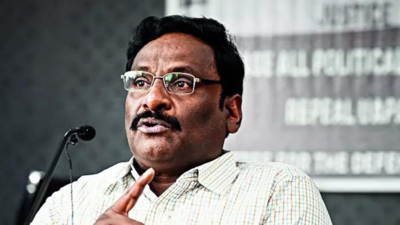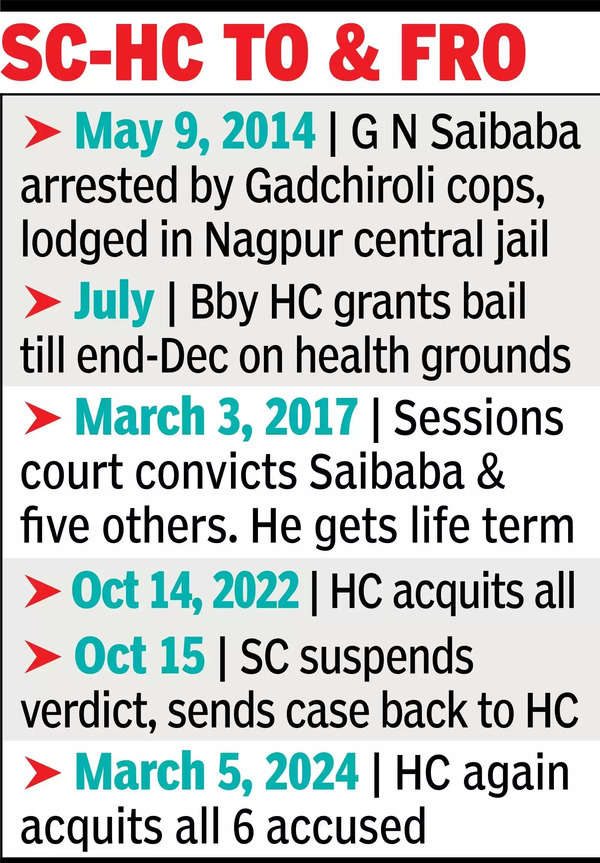
HYDERABAD: Barely seven months after he was cleared of having links with Maoists by Bombay HC, which called the trial court proceedings a “failure of justice”, former DU professor GN Saibaba died Saturday night at Nizam’s Institute of Medical Sciences hospital. Doctors said he was admitted for removal of gallstones and died of post-surgery complications.
The 57-year-old wheelchair-bound teacher and activist spent over seven years in jail after he was first arrested in May 2014.He was acquitted in March by the HC. “When I went to prison, I had no ailm ent other than my disability. Now, my heart is 55% functional… liver, gallbladder and pancreas have also been affected,” he’d said on his release.
Sai’s struggle started at 5 & never ended, say friends
Acquitting him, the Nagpur bench of Bombay High Court had called the trial court proceedings a “failure of justice”, and pointed out the lack of sanction under UAPA to prosecute him. It also said the prosecution had failed to establish the seizure of incriminating material from his house.
“When I went to prison, I had no ailments other than my disability. Now, my heart i s only 55% functional, and I am facing muscular complications. My liver, gallbladder and pancreas have also been affected. My right hand is partially functional. My doctor says I need multiple surgeries,” he had told reporters after his release on March 6.
“I couldn’t go to the prison hospital. There was not a single access ramp for the disabled in the jail, no separate toilets. I was always physically lifted for my toilet and bath needs. How can one live like that?” he had said. Saibaba was kept in the ‘anda cell’ (solitary confinement) at Nagpur central jail, which, he said, affected him mentally as well.

Probe agencies came across Saibaba’s name allegedly after the arrest of a JNU student who claimed to have been acting as a courier between the professor and Maoists holed up in Abujhmarh forests in Chhattisgarh. Saibaba was arrested by Maharashtra police for allegedly conspiring to wage war against the nation besides violations under the Unlawful Activities Prevention Act (UAPA). A Gadchiroli court convicted him of the charges and awarded him life imprisonment in 2017. After a prolonged legal battle, he was acquitted by the high court.
“Saibaba played a key role in several people’s movements like pro-reservation protests in 1989-90, democratic rights of prisoners in 1993, movement to support the rights of Adivasis, and several others. Though he hailed from Andhra Pradesh, he led a huge public meeting in support for the formation of separate Telangana in 1997,” said K Ravi Chander, convener for Forum Against Repression, who knew Saibaba for 35 years.
Saibaba was born in Anakapalli in AP. After graduating, he p ursued his postgraduation in University of Hyderabad. He was working as an English professor in Delhi University until he was arrested. After he was released from jail, he underwent medical treatment in Delhi for various health complications — a fallout of his prolonged stay in jail. He is survived by his wife and daughter.
His friends and colleaguesremembered Saibaba, whom they fondly called Sai, as a fighter. “He got polio when he was five years old. That is when his struggle began and never ended,” said Nandita Narain, former St Stephen’s College professor. “I learnt about him when I was elected member of DU’s Executive Council from 1996 to 2000. He once came to my house with his wife when he didn’t have a wheelchair. He was just dragging himself, but had a big smile on his face.”
Narain added, “Those 10 years in jail left him completely broken. He was thrown around and dragged when he got arrested. He had 21 ailments when we last counted. They did this to him because he spoke up on issues that nobody spoke about. They wanted to crush his voice. He still had the determination. In the prison, he used to teach inmates.” She also remembered, “When he came out of prison, he made pickles with lemons from Medak himself and gave them to me. He said it would be good for my health.”
Saibaba had a strong presence and he drove things, recalled Karen Gabriel, viceprincipal of St Stephen’s. “We had common issues that we were fighting like land grabbing, illegal mining, etc., and we became good friends”.
Gabriel said Saibaba hadn’t ever been fragile. “Then we saw how fragile they made him in prison. He was barely able to lift his right arm when left jail. His organs were damaged,” she said. “I spoke to his family and they are in a shambles.”
(With inputs from Meghna Dhulia)





